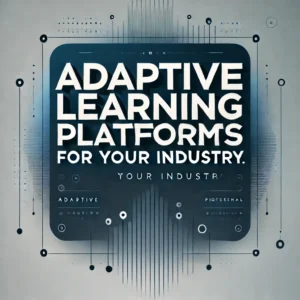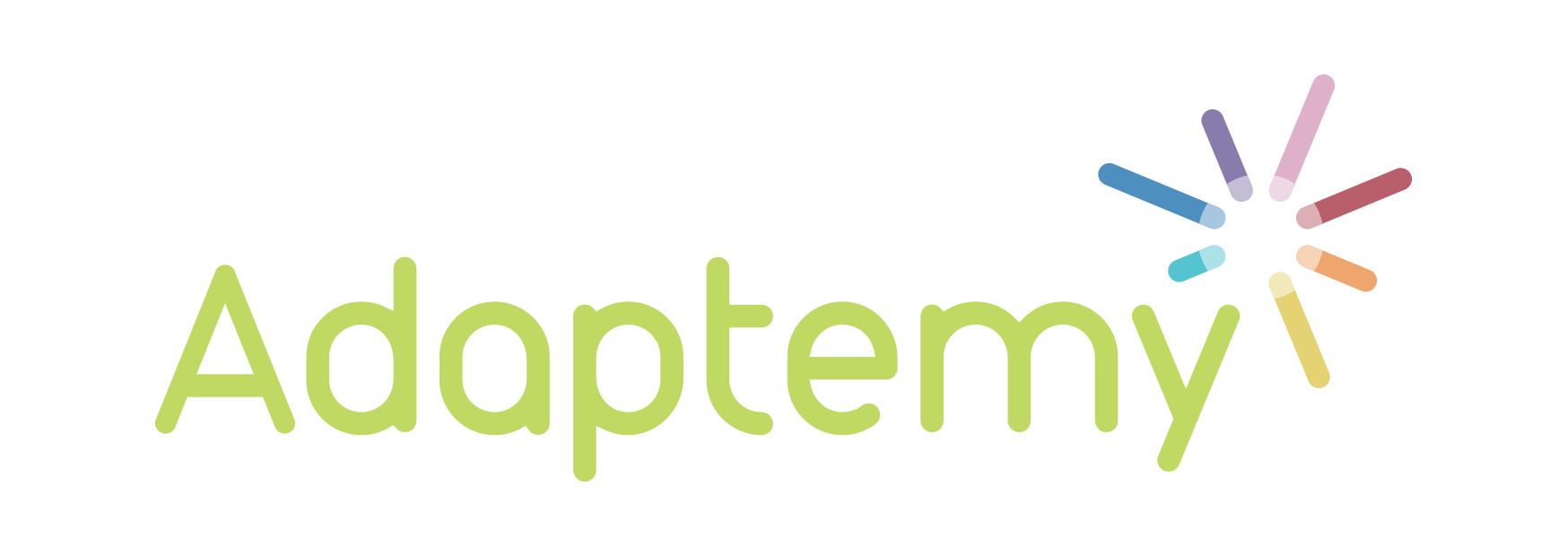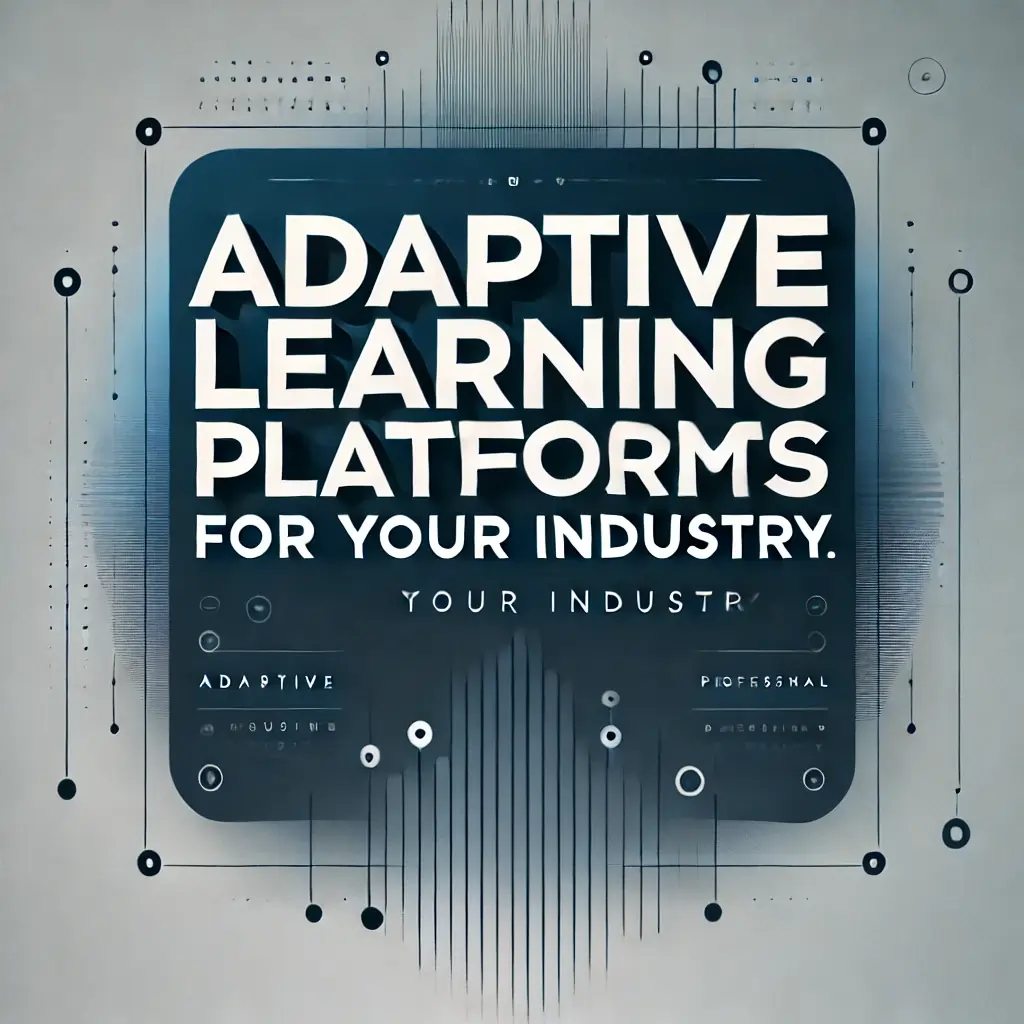
Adaptive learning has emerged as a transformative approach in the training systems and training sectors, revolutionizing how individuals learn by providing personalized experiences tailored to their specific needs and abilities.
This innovative method leverages technology to continuously assess learners’ progress, adjusting content and assessments in real-time to optimize and improve learning outcomes. As a result, adaptive learning is becoming increasingly important across various industries, from K-12 and higher education to corporate training and professional development.
Different industries have unique training and learning requirements, which is where adaptive learning platforms excel. These platforms can be customized to cater to diverse needs—whether it’s enhancing math skills for young students, providing up-to-date technical training for IT professionals, or creating engaging, mobile-friendly courses for a distributed workforce.
By using data-driven insights and real-time feedback, adaptive learning platforms ensure that each learner receives the right content at the right time, making the learning process more effective and engaging.
The goal of this article is to highlight the top adaptive learning platforms suited for specific industries. We will explore each platform’s key features and advantages, demonstrating how they cater to the unique needs of their target sectors, and ultimately help organizations and educators choose the best solution to enhance learning and development within their domains.
Understanding Adaptive Learning and Its Industry Applications
Adaptive Learning Defined and Its Core Principles
Adaptive learning is a personalized educational approach that utilizes technology and data to tailor learning experiences to the individual needs, abilities, and preferences of each learner.
The core principle behind adaptive learning is its ability to dynamically adjust content, difficulty, and assessment methods based on real-time feedback from the learner’s performance.
This continuous adjustment helps ensure that learners are always engaged with material that is appropriately challenging and relevant, promoting deeper understanding and retention of course materials.
At its foundation, adaptive learning relies on several key components:
Continuous Assessment: Adaptive learning systems constantly evaluate learner progress through quizzes, exercises, and interactive learning activities throughout. This ongoing assessment allows the machine learning system to understand the learner’s strengths, weaknesses, and knowledge gaps.
Personalized Learning Paths: Based on assessment data, adaptive learning systems customize the learning path for each of individual students, delivering content that is specifically targeted to their current level of understanding.
Real-Time Feedback and Adjustments: Learners receive immediate, feedback based on their performance, which helps them correct mistakes, reinforces learning, and keeps them motivated. The system also adjusts future content in response to this feedback, ensuring that learner and learning remains relevant and effective.
Leveraging Adaptive Learning Across Different Industries
Adaptive learning technology has broad applications across various industries, each with its own unique set of needs and challenges. Here’s how adaptive learning can be effectively utilized in different sectors:
Education (K-12 and Higher Education): In educational settings, adaptive learning systems are used to provide personalized instruction provide feedback that meets each student’s unique learning pace and style. For K-12, platforms can help reinforce foundational skills, such as reading and math, by adapting to the student’s progress and providing additional support where needed. In higher education, adaptive platforms can help students master complex subjects by offering tailored resources and feedback, helping them stay on track and succeed in their courses.
Corporate Training: In the corporate world, adaptive learning systems are essential for employee training and professional development. These platforms can create personalized training programs that address individual knowledge gaps and enhance specific skills needed for various roles. Adaptive learning ensures that employees receive training that is directly applicable to their job functions, which improves efficiency, productivity, and job satisfaction.
Technology and Software Development: Adaptive learning is particularly beneficial in fast-paced industries like technology and software development, where skills and knowledge need to be continuously updated. Platforms can offer on-demand training tailored to an employee’s current skill level, helping them keep up with the latest tools, programming languages, and technological advancements, ensuring they remain competent and competitive in their field.
Healthcare: In healthcare, adaptive learning systems can be used to provide personalized training and continuous learning for medical professionals. These platforms help practitioners stay current with medical knowledge, regulations, and best practices by adapting content to their specific learning needs and professional requirements. This personalized approach ensures that healthcare providers can deliver the highest quality of care and respond effectively to new challenges in the medical field.
Adaptive Learning Platforms for K-12 Education
Adaptive learning systems are increasingly being used in K-12 education to provide personalized learning experiences that cater to each student and learner’s unique, needs and pace. These platforms are particularly effective in enhancing engagement, understanding, and retention in young learners by delivering the learning content that is interactive, adaptive, and responsive to student performance. Here are two top adaptive learning systems that excel in the K-12 education sector:
DreamBox Learning

- Industry Fit: K-8 math education.
- Key Features:
- Adaptive Learning Paths: DreamBox Learning continuously adapts its instructional content based on each student’s interactions and performance. This ensures that students receive challenges appropriate to their skill level, promoting gradual and sustained learning progress.
- Interactive and Engaging Lessons: The platform offers a variety of interactive lessons that are designed to be engaging and fun. These lessons use visual aids and intuitive interfaces to help students grasp mathematical concepts more easily.
- Real-Time Progress Tracking: Educators and parents can monitor student progress in real time, allowing them to identify areas where a student might be struggling and provide additional support if needed.
- Benefits: DreamBox Learning provides personalized math instruction that helps young students build a strong foundation in mathematical concepts. By focusing on adaptive learning paths and interactive lessons, the platform fosters critical thinking and problem-solving skills, ensuring that students not only understand mathematical principles but can also apply them in various contexts.
Smart Sparrow
- Industry Fit: General K-12 education.
- Key Features:
- Customizable Content Creation: Smart Sparrow allows educators to create customized content tailored to their specific curriculum needs. Teachers can design interactive lessons and simulations that respond dynamically to student input, creating a more personalized learning experience.
- Interactive Simulations: The platform supports interactive simulations that mimic real-world scenarios and classroom settings. These simulations help students understand complex concepts through hands-on experiences, making learning more relatable and effective.
- Real-Time Feedback: Smart Sparrow provides immediate feedback to students based on their responses, helping them understand their mistakes and learn from them in real time. This feedback loop is essential for reinforcing correct answers and improving learning outcomes.
- Benefits: Smart Sparrow enhances student engagement through interactive learning experiences that are tailored to each learner’s needs. The ability to create and modify content based on student feedback allows for a dynamic and responsive educational environment, which is especially effective for younger learners who benefit from more interactive and varied content. This approach boosts engagement and aids in deeper understanding and retention of the material.
Adaptive Learning Platforms for Higher Education
Higher learning institutions face the challenge of catering to a diverse student population with varying learning styles, paces, and needs. Adaptive learning platforms in this sector are designed to provide personalized educational experiences that enhance comprehension, engagement, and retention, particularly in complex subjects. Here are two leading adaptive learning systems that are well-suited for higher education:
McGraw-Hill Education’s Connect
- Industry Fit: Higher education institutions.
- Key Features:
- Adaptive Learning Technology: McGraw-Hill Education’s Connect utilizes advanced adaptive learning algorithms to customize content delivery based on individual student performance. The platform continuously assesses each learner’s progress and adjusts the material to better suit their understanding and needs.
- Comprehensive Analytics for Monitoring Progress: The platform provides detailed analytics and reporting tools that allow educators to track student performance over time. These insights help identify patterns, predict outcomes, and pinpoint areas where students may need additional support.
- Benefits: McGraw-Hill Education’s Connect helps educators personalize instruction to accommodate the diverse needs of students, particularly in challenging or complex subjects. By tailoring content and pacing to individual performance, the platform enhances comprehension and retention, ensuring that students not only learn but also master the material. This personalized approach can lead to improved academic outcomes and a more engaged student body.
Knewton
- Industry Fit: Personalized learning in higher education.
- Key Features:
- Data-Driven Insights: Knewton uses data analytics to provide insights into each student’s learning habits, strengths, and weaknesses. This data-driven approach allows the platform to adapt content dynamically, ensuring that each student receives the most relevant and effective material based on their current understanding.
- Integration with Existing Educational Materials: Knewton seamlessly integrates with existing educational resources and platforms, allowing educators to incorporate adaptive learning into their current curriculum without significant disruptions. This integration ensures that learning remains coherent and continuous, even as the platform adjusts content to individual needs.
- Adaptive Content Delivery: The platform delivers personalized content that aligns with each student’s academic path, adjusting in real-time to their learning progress and comprehension levels.
- Benefits: Knewton enhances the higher education learning experience by offering tailored content that aligns with each student’s academic goals and progress. This personalized approach boosts engagement, as students are more likely to stay motivated when learning materials are directly relevant to their needs. Additionally, by focusing on retention and comprehension, Knewton helps students build a deeper understanding of the subject matter, which is essential for success in higher education.
Adaptive Learning Platforms for Corporate Training
In the fast-paced world of corporate training and professional development, adaptive learning technology are key to providing personalized and efficient learning experiences that cater to the specific needs of employees. These platforms help organizations create targeted training programs that enhance knowledge retention, skill development, and overall job performance. Here are three top adaptive learning technology that excel in the corporate training environment:
EdApp
- Industry Fit: Corporate training and professional development.
- Key Features:
- Mobile-First Design: EdApp is designed with a mobile-first approach, allowing employees to access training materials anytime and anywhere, making it ideal for remote or distributed teams. This flexibility ensures that learning can happen on-the-go, which is particularly beneficial for busy professionals.
- Gamification Elements: The platform incorporates gamification elements, such as quizzes, leaderboards, and rewards, to enhance engagement and motivation. By making learning more interactive and fun, EdApp helps maintain high levels of employee interest and participation.
- Customizable Authoring Tools: EdApp provides easy-to-use authoring tools that enable organizations to create customized training content tailored to their specific needs and objectives. This feature allows for a highly personalized training experience that can be adapted to different roles and learning styles within the organization.
- Benefits: EdApp’s mobile-friendly platform and gamified learning experience allow organizations to deliver engaging, on-the-go training that is tailored to employees’ unique roles and preferences. This approach enhances knowledge retention and practical application, leading to more effective training outcomes and a better-prepared workforce.
Realizeit
- Industry Fit: Customized corporate training.
- Key Features:
- Continuous Assessment: Realizeit continuously assesses employee performance through various interactive modules and assessments. This feature helps identify knowledge gaps and adjust training content in real-time, ensuring that employees focus on areas where they need the most improvement.
- Adaptable Learning Paths: The platform offers adaptable learning paths that adjust dynamically based on individual progress and performance. Employees can learn at their own pace, which leads to more progressive learning and better mastery of skills.
- Data Analytics for Performance Tracking: Realizeit provides detailed analytics and insights into employee performance, allowing organizations to track progress, measure training effectiveness, and make informed decisions about future training initiatives.
- Benefits: Realizeit empowers employees to learn at their own pace, adapting training content to their specific skill levels and needs. This personalized approach leads to better mastery of skills and knowledge application, ensuring that employees are well-equipped to meet the demands of their roles and contribute to organizational success.
Docebo
- Industry Fit: Learning management and corporate training.
- Key Features:
- AI-Driven Learning Path Recommendations: Docebo uses artificial intelligence to recommend personalized learning systems based on individual employee performance and learning history. This feature ensures that each employee receives training that is most relevant to their current needs and career development goals.
- Social Learning Capabilities: The platform encourages collaborative learning through social learning features, such as discussion boards, peer reviews, and group projects. This fosters a sense of community and teamwork among employees, enhancing the overall training experience.
- Benefits: Docebo enhances the corporate training experience by providing personalized content tailored to each employee’s needs while also promoting a collaborative learning environment. This approach not only improves individual learning outcomes but also builds a more cohesive and connected workforce, contributing to a positive organizational culture.
Adaptive Learning Platforms for Technology and Software Development Training
In the technology and software development sector, continuous learning and skill development are crucial due to the rapid pace of innovation and change. Adaptive learning system tailored for this industry helps employees stay current with the latest technologies, programming languages, and software tools. Here are two top adaptive learning system that excels in providing training for technology and software development:
Pluralsight
- Industry Fit: Technology and software development.
- Key Features:
- Skill Assessments: Pluralsight offers skill assessments that evaluate an employee’s current competencies and knowledge gaps. This enables learners to focus on areas that need improvement, ensuring efficient use of training time and resources.
- Interactive and Adaptive Courses: The platform provides interactive courses that adapt to the learner’s progress and performance. This adaptive approach helps ensure that content remains relevant and appropriately challenging, promoting sustained engagement and mastery.
- Performance-Based Content Delivery: Pluralsight uses performance data to deliver content that aligns with each learner’s needs and goals. This data-driven approach ensures that training is highly relevant to the learner’s job role and career path.
- Benefits: Pluralsight ensures that employees in tech roles can develop critical skills at their own pace, allowing them to keep up-to-date with rapidly evolving industry standards and practices. By focusing on skill gaps and providing tailored content, Pluralsight helps organizations build a highly skilled and agile workforce capable of adapting to new technologies and challenges.
Gyde

- Industry Fit: Software training and onboarding.
- Key Features:
- Real-Time Guidance: Gyde provides real-time, in-application guidance that helps employees learn software tools as they use them. This feature is particularly valuable for onboarding new employees or introducing new software, as it reduces the need for separate training sessions and accelerates the learning process.
- Audio-Visual Walkthroughs: The platform includes audio-visual walkthroughs that demonstrate how to use software tools effectively. These walkthroughs are designed to be intuitive and easy to follow, making complex processes simpler and more accessible.
- Contextual Help Articles: Gyde offers contextual help articles that provide additional support and information based on the specific task or software feature being used. This helps employees quickly resolve issues and learn independently, enhancing productivity.
- Benefits: Gyde reduces the learning curve for new software tools, boosting productivity and efficiency in tech environments. By providing immediate, context-sensitive support and guidance, Gyde helps employees quickly become proficient with new technologies, minimizing downtime and maximizing the return on investment for software and training resources.
Adaptive Learning Platforms for Public Organizations and Educational Institutions
Public organizations and educational institutions often require adaptive learning solutions that can handle diverse learning needs and large-scale deployments. These platforms need to provide personalized and custom learning experiences that accommodate varying levels of knowledge and skill among learners while also being scalable to suit the needs of large groups. Here are two leading adaptive learning resources designed for public sector organizations and educational institutions:
Adaptemy

- Industry Fit: Public sector and educational institutions.
- Key Features:
- AI-Driven Assessments: Adaptemy utilizes artificial intelligence to deliver assessments that adapt in real-time based on the learner’s performance. This dynamic approach ensures that learners are constantly challenged at an appropriate level, promoting better engagement and understanding.
- Real-Time Feedback on Performance: The platform provides realtime feedback to learners, allowing them to understand their mistakes and make corrections in real time. This continuous feedback loop helps reinforce learning and improves retention by addressing gaps in knowledge as they occur.
- Customizable Content: Adaptemy allows educators and administrators to customize content to meet specific curriculum goals and educational standards. This flexibility makes it possible to tailor learning experiences to different groups of learners, accommodating a wide range of educational needs and objectives.
- Benefits: Adaptemy supports diverse learning needs with personalized experiences, making it particularly suitable for large-scale educational initiatives within the public sector and educational institutions. Its ability to adapt in real-time and provide immediate feedback helps ensure that all learners receive the support they need, regardless of their starting point or learning style.
CogBooks

- Industry Fit: Educational institutions seeking enhanced student learning.
- Key Features:
- Adaptive Technology that Responds to Student Interactions in Real-Time: CogBooks uses adaptive technology that adjusts content based on student interactions and performance. This ensures that students receive materials that are most relevant to their current level of understanding, fostering deeper engagement and learning.
- Comprehensive Analytics: The platform offers comprehensive analytics that provide insights into student progress and learning patterns. Educators can use this data to identify areas where students are struggling and adjust instruction accordingly, ensuring a more personalized learning experience.
- Benefits: CogBooks provides tailored learning experiences that adjust to each student’s needs, ensuring they receive appropriate support at every learning stage. This adaptability helps educators effectively address diverse learning styles and paces, improving overall educational outcomes. The platform’s real-time responsiveness and detailed analytics make it a powerful tool for enhancing student engagement and success in various educational settings.
Advantages of Adaptive Learning Across Industries
Adaptive learning resources offer a multitude of advantages across various industries, from education to corporate training and beyond.
These platforms provide a flexible, data-driven approach to learning that not only enhances individual engagement and improved learning outcomes, but also delivers significant long-term advantages for organizations. Here’s a closer look at the common advantages of adaptive learning platforms across different sectors:
Common Advantages of Adaptive Learning Platforms
Improved Engagement:
Adaptive learning platforms keep learners engaged by providing content that is tailored to their specific needs, abilities, and interests. This personalized approach helps maintain motivation, as learners are more likely to engage with material that is relevant and appropriately challenging. By adjusting the difficulty and type of content based on real-time performance, adaptive teaching ensure that learners remain focused stay engaged, and motivated throughout their learning journey.
Personalized Learning Experiences:
One example of the core benefits of adaptive learning is its ability to evaluate data and to create highly personalized learning experiences. These platforms use data analytics to continuously assess each learner’s progress and adapt content accordingly. This ensures that every learner receives instruction that is suited to their current level of understanding, learning style, and pace, leading to more effective and meaningful learning experiences.
Increased Efficiency:
Adaptive learning platforms enhance efficiency by allowing learners to focus on areas where they need the most improvement, rather than wasting time on material they already understand. This targeted approach reduces the time needed to achieve learning objectives and ensures that resources are used more effectively. In corporate settings, this means employees can quickly acquire the skills they need without lengthy or redundant training sessions, resulting in faster onboarding and upskilling.
Data-Driven Decision-Making:
These platforms provide comprehensive data and predictive analytics on learner performance, engagement, and progress. Educators, trainers, and managers can use these insights to make informed decisions about instructional strategies, content development, and resource allocation. This data-driven approach allows organizations to continuously refine and improve their learning programs, ensuring they meet the evolving needs of their learners and achieve desired outcomes.
Long-Term Benefits of Adaptive Learning
Enhanced Retention and Skill Development:
By offering personalized learning systems that adapt to the individual needs of learners, adaptive learning platforms enhance knowledge retention and skill development. Learners are more likely to retain information and develop skills when they are engaged with content that is relevant and challenging. This is particularly important in sectors such as education and corporate training, where the goal is to build long-term competencies and expertise.
Improved Productivity:
Adaptive learning platforms contribute to improved productivity by enabling faster and more effective learning. In corporate environments, this means employees can quickly become proficient in new skills and apply them on the job, reducing downtime and enhancing overall productivity. In educational settings, students are able to progress at their own pace, which can lead to higher academic achievement and a more efficient path to mastery.
Higher Return on Investment (ROI):
Organizations that invest in adaptive learning platforms often see a higher ROI due to the increased effectiveness and efficiency of their training programs. By reducing the time and resources needed to meet students’ for training and improving learning outcomes, adaptive teaching provide significant cost savings and enhance the overall value of educational and training initiatives. The ability to tailor learning experiences to individual needs also reduces dropout rates and turnover, further maximizing the return on investment.
Scalability and Flexibility:
Adaptive learning platforms are highly scalable and can be tailored to fit the needs of both small and large organizations. They offer the flexibility to support diverse learning objectives, whether for a single department or across an entire institution. This scalability ensures that as an organization grows or changes, its learning solutions can adapt accordingly, providing consistent and effective learning experiences to all learners.
Conclusion
Choosing the right adaptive learning platform is crucial for maximizing learning outcomes and ensuring that educational and training programs meet the specific needs of their intended audiences.
As we have explored, different industries—from K-12 and higher education to corporate training and technology—require unique features and capabilities from their adaptive learning platforms to effectively support their goals.
Key Points to Consider:
Industry-Specific Needs: Different industries have varying requirements when it comes to adaptive learning. For instance, K-12 education may focus on foundational skills and engagement through interactive lessons, while corporate training often emphasizes practical skills development and efficiency. Understanding the specific needs of your industry is the first step in selecting the right platform.
Key Features and Advantages: Adaptive learning platforms offer a range of features such as personalized learning systems, real-time feedback, and data analytics. These features help tailor the learning experience to individual needs, improve engagement, and optimize learning outcomes. Selecting a platform with the right features is essential to achieving your organization’s educational or training objectives.
Long-Term Advantages: Investing in adaptive learning platforms can lead to enhanced retention, skill development, productivity, and a higher return on investment. These long-term advantages make adaptive learning a valuable tool for any organization looking to improve its learning and development programs.
When choosing an adaptive learning platform, it’s important for readers to carefully assess their specific needs and objectives. Consider factors such as the size of your organization, the diversity of your learners, and the specific outcomes you wish to achieve.
Exploring numerous benefits of the various platforms discussed in this article, and perhaps even trialing a few, can help identify which solution best aligns with your unique requirements.
Unlock the full potential of adaptive learning with Riseup Global! Enhance engagement, personalize learning experiences, and drive results with cutting-edge solutions. Let us help you stay ahead in today’s dynamic learning environment.

